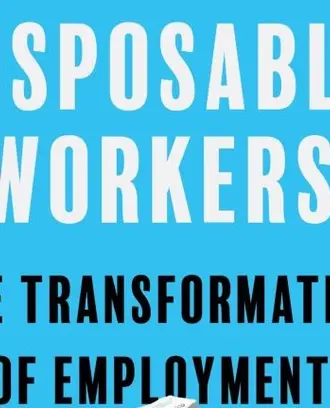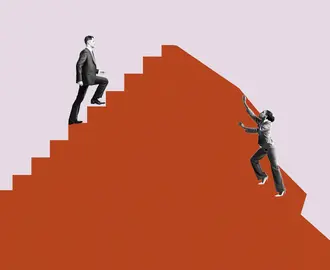How do women in low-wage service-sector jobs respond to unemployment?
In a variety of ways, according to a recent MIT Sloan doctoral dissertation—and one of the most effective may be searching quickly for work to fill available hours, regardless of whether or not the job or jobs found are in the same sector as an individual’s previous employment.
As part of her MIT Sloan doctoral dissertation in the MIT Institute for Work and Employment Research (IWER) PhD program, Claire C. McKenna conducted in-depth interviews with 41 women in the Boston area who lost relatively low-paying hourly service-sector employment toward the beginning of the COVID-19 pandemic. Specifically, these women had been separated from standard and non-standard employment in hotels, food service, and retail. (McKenna’s dissertation, which she successfully defended in September 2023, also included a quantitative analysis of the effects of different levels of strictness in state unemployment insurance (UI) policies before the COVID-19 pandemic on out-of-work individuals during the pandemic, both in terms of the time it took them to find work and the quality of jobs found.)
Claire C. McKenna
For the qualitative section of her dissertation, McKenna focused on a racially diverse group of women who had been working in low-paying service sector jobs when COVID-19 hit. She chose that focus in part because she saw low-wage women as a population underrepresented in prior qualitative academic research on unemployment. In the study, “I help fill a gap in the qualitative literature in sociology on job loss and unemployment, which tends to focus on more advantaged workers, including professionals, White, U.S.-born workers, or men displaced by factory closings,” McKenna wrote. She conducted the interviews between July 2021 and July 2022.
Perhaps not surprisingly, McKenna found that “involuntary job loss has the potential to significantly disrupt low-wage women’s already fragile career paths.” But she also identified four different ways in which women responded, which she dubbed Recover, Switch/Stack, Reach, and Step Back.
Women in the “Recover” category, who represented about a third of the interviewees, hoped to return to their old jobs, or similar jobs, once the public health situation improved. They were, in general, the most socio-economically advantaged subset of the interviewees; women in the “Recover” category were more likely to be married or have some higher education than the other women McKenna interviewed, and most of the women in this group were White. They were also slightly older, on average, than the interviewees as a whole and expressed more attachment to their prior jobs (including to their supervisors), as well as an expectation that their loyalty and experience would be rewarded once the public health crisis abated. However, at the time of the interviews, the majority of the women in this group were either facing unstable work schedules or had not yet returned to working steadily.
After losing their jobs, women in the “Reach” category attempted to transition out of hourly service-sector work by gaining new skills as preparation for a new career or by pursuing informal self-employment like meal prep or digital content creation. McKenna observed that, for some of these interviewees, the decision to leave hourly service work “reflected a strategy of coping with an inhospitable institutional environment for working parents, particularly single mothers.” However, the majority of the women in the “Reach” category found the path to a new career challenging.
Finally, a few women were in the “Step Back” category, where they responded to unemployment by focusing more on other aspects of life, such as caring for children, sometimes supplemented by under-the-table or online gig work.
But the group of 12 women that seemed—in an admittedly small, non-random sample—to have the best employment outcomes were in the category McKenna dubbed “Switch/Stack.” These women were mostly Black or Latina and about half were immigrants, including three of the study’s five undocumented participants; they tended to be a bit younger on average than other interviewees and to have fewer economic resources to fall back on. In part because their situations were economically precarious, women who took the “Switch/Stack” approach sought to fill their work hours quickly with any work they could find, and often took multiple jobs. By the time of the interviews, 11 of the 12 were earning steady work-based income, mostly from new positions, and six had higher hourly wages in their primary jobs than they had earned before (although not necessarily higher income, as many did not have as many work hours as before the pandemic). Women in this group had less loyalty to any given employer, instead seeking the best work they could find. In general, women employing the “Switch/Stack” strategy “expected less from work…, and extracted only what they needed,” McKenna observed. “Participants in this category also projected less deference to the idea of work as a source of meaning or fulfillment.”
One conclusion that McKenna drew from her research is that low-wage women’s choices about how to respond to job loss are influenced by an interweaving of a range of factors, from the personal relationships and networks a particular woman has available to her to her ability to access institutional supports such as the unemployment insurance system. McKenna’s study also “identifies multiple ways women’s cultural beliefs may influence responses” to job loss. Such beliefs—for example, about receipt of government assistance or the role of work in one’s life—seemed to precede or underpin other factors, rather than operating independently from them. She also noted that a number of the interviewees had student loan debt, and the difficulties experienced by the women in the “Reach” category highlight the need for greater investment in low-cost avenues for workers to enhance their skills, such as community colleges.
Having completed the requirements of the IWER PhD program, McKenna has already started a new job in a field related to her doctoral research topic: She is a Senior Policy Analyst in the U.S. Department of Labor’s Office of Unemployment Insurance Modernization. Her dissertation offers her many insights into this work. For example, “while my interviews didn’t focus exclusively on women’s experiences with UI, they suggest that efforts to improve digital interfaces (or physical spaces) [as part of modernizing the UI system] should center the concept of dignity,” McKenna observed. “Dignity serves as a powerful benchmark for evaluating efforts to expand UI access. When people feel like they’re treated respectfully, they may be more inclined to exercise their rights to needed benefits and services rather than abandon the process, and return in the future, if necessary. It may help reduce the stigma associated with receipt, too.”



